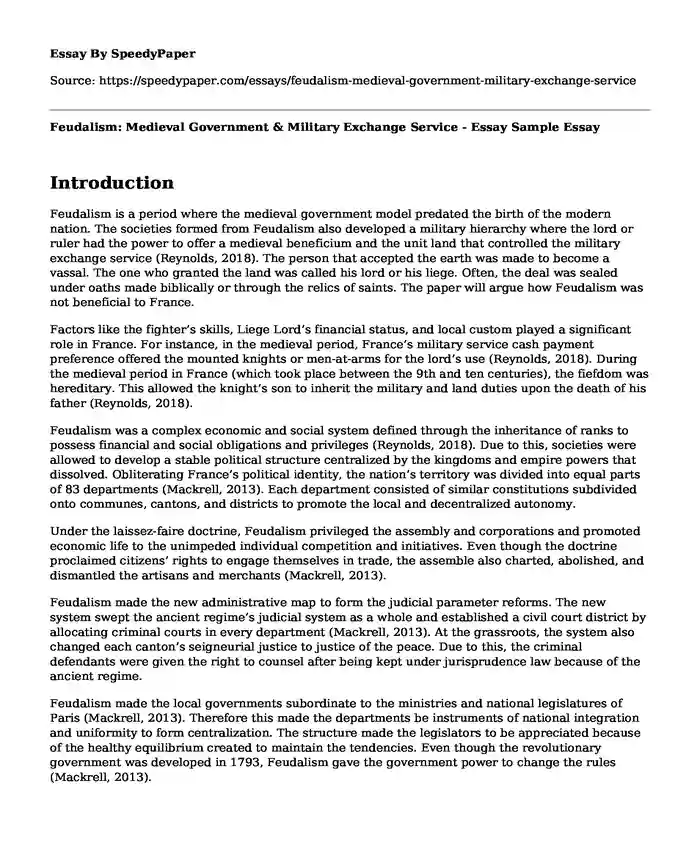
| Type of paper: | Essay |
| Categories: | History Government Army |
| Pages: | 3 |
| Wordcount: | 635 words |
Introduction
Feudalism is a period where the medieval government model predated the birth of the modern nation. The societies formed from Feudalism also developed a military hierarchy where the lord or ruler had the power to offer a medieval beneficium and the unit land that controlled the military exchange service (Reynolds, 2018). The person that accepted the earth was made to become a vassal. The one who granted the land was called his lord or his liege. Often, the deal was sealed under oaths made biblically or through the relics of saints. The paper will argue how Feudalism was not beneficial to France.
Factors like the fighter’s skills, Liege Lord’s financial status, and local custom played a significant role in France. For instance, in the medieval period, France’s military service cash payment preference offered the mounted knights or men-at-arms for the lord’s use (Reynolds, 2018). During the medieval period in France (which took place between the 9th and ten centuries), the fiefdom was hereditary. This allowed the knight’s son to inherit the military and land duties upon the death of his father (Reynolds, 2018).
Feudalism was a complex economic and social system defined through the inheritance of ranks to possess financial and social obligations and privileges (Reynolds, 2018). Due to this, societies were allowed to develop a stable political structure centralized by the kingdoms and empire powers that dissolved. Obliterating France’s political identity, the nation’s territory was divided into equal parts of 83 departments (Mackrell, 2013). Each department consisted of similar constitutions subdivided onto communes, cantons, and districts to promote the local and decentralized autonomy.
Under the laissez-faire doctrine, Feudalism privileged the assembly and corporations and promoted economic life to the unimpeded individual competition and initiatives. Even though the doctrine proclaimed citizens’ rights to engage themselves in trade, the assemble also charted, abolished, and dismantled the artisans and merchants (Mackrell, 2013).
Feudalism made the new administrative map to form the judicial parameter reforms. The new system swept the ancient regime’s judicial system as a whole and established a civil court district by allocating criminal courts in every department (Mackrell, 2013). At the grassroots, the system also changed each canton’s seigneurial justice to justice of the peace. Due to this, the criminal defendants were given the right to counsel after being kept under jurisprudence law because of the ancient regime.
Feudalism made the local governments subordinate to the ministries and national legislatures of Paris (Mackrell, 2013). Therefore this made the departments be instruments of national integration and uniformity to form centralization. The structure made the legislators to be appreciated because of the healthy equilibrium created to maintain the tendencies. Even though the revolutionary government was developed in 1793, Feudalism gave the government power to change the rules (Mackrell, 2013).
A few other objections denied the importance of Feudalism in France by claiming that it discouraged economic growth and trade. This is because most farms were worked by the serfs who rejected people’s settlement if their lord has not given permission. Also, the feudal lords took one-third of the produced fees and taxes in exchange for the serfs’ rights to work there (Mackrell, 2013). Due to this, they lost a lot of money, and this made economic growth difficult.
Conclusion
Feudalism was a complex economic and social system defined through the inheritance of ranks to possess financial and social obligations and privileges. For instance, at the grassroots, the structure made the legislators to be appreciated and gave the government power to change the rules. Even though there were a few other objections, Feudalism promoted the local and decentralized autonomy.
References
Mackrell, J. (2013). The attack on Feudalism in eighteenth-century France. https://doi.org/10.4324/9780203707326
Reynolds, S. (2018). Government and community. The Middle Ages without Feudalism, 86-4. https://doi.org/10.4324/9781351219068-9
Cite this page
Feudalism: Medieval Government & Military Exchange Service - Essay Sample. (2023, Nov 22). Retrieved from https://speedypaper.net/essays/feudalism-medieval-government-military-exchange-service
Request Removal
If you are the original author of this essay and no longer wish to have it published on the SpeedyPaper website, please click below to request its removal:
- Should U.S Weaponize Space? Free Essay Sample
- Free Essay Example on the Zia Sun Symbol
- Essay Sample on Comparing Nationalism in the Philippines and Burma
- Free Essay. Immigration Behind the Buster
- Essay Sample on Democratic Leadership: Mrs. Cameron, an Effective Nursing Manager
- Paper Example. The Civil Rights Movements History
- Paper Sample on Individual Taxation
Popular categories




